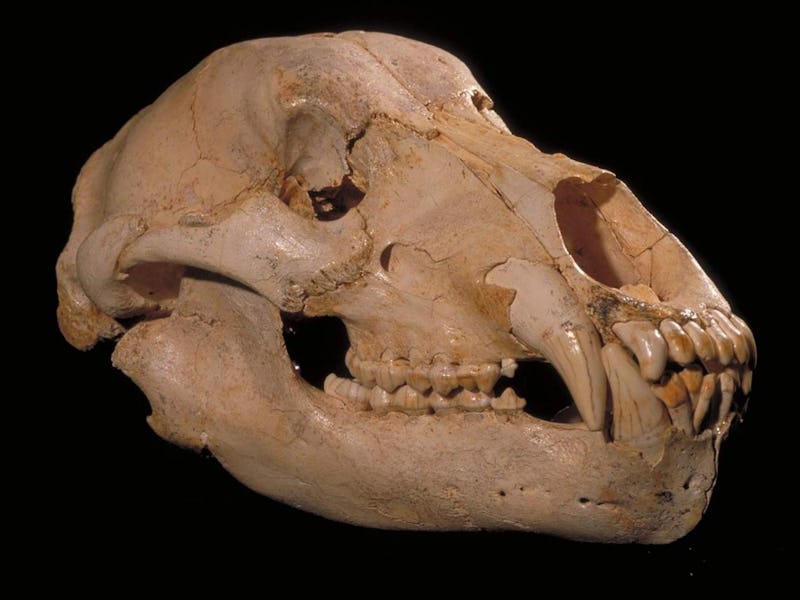Ancient Cave Bear's Surprising Diet Reveals a Harmless, Doomed Beast
Its unusual adaptation could have also been its downfall.

Cave bears have fascinated humans for the past 32,000 years. Our Paleolithic ancestors competed with the now-extinct mammals for caves — prime real estate — and then covered their walls with images of the beasts. Today, the cave bears’ allure lies in a scientific mission to understand their relationship with ancient humans and to discover why they went extinct. The answer, write scientists in a new Historical Biology paper, might stem from the bear’s counterintuitive diet.
When you think of an ancient bear, you might imagine it stalking ancient humans in an attempt to chew them up, The Revenant-style. But one highly debated theory negates that predator-and-prey relationship. Some scientists believe that the cave bear, or Ursus spelaus, was a vegetarian. While some recent studies have proposed the cave bear was an omnivore or carnivore, Bavarian State Collection of Zoology professor Anneke van Heteren, Ph.D., a co-author of the new study, explains to Inverse that her previous analyses “clearly show that the classic cave bear was herbivore as it evolved in the same direction as the giant panda, which is also completely herbivorous.”
Since that assertion didn’t quell the debate, van Heteren and her team took the research one step further and examined the morphology of the animal’s direct ancestor, Ursus deningeri, in the new paper. More commonly known as Deninger’s bear, this extinct beast lived between 1.7 million to 100,000 years ago. Cave bears, meanwhile, lived between 125,000 to 12,000 years ago alongside omnivorous brown bears — the ancestors of the guys who now try to break into your ice chest.
Micro-CT reconstructions. A represents a subadult Deninger's bear skull and B represents the skull of a classic cave bear.
If the study revealed that the Deninger’s bear had a mandible and skull adapted to vegetarianism, then it would prove that this adaption was already a part of the animal’s morphology before cave bears descended from them. And that’s essentially what the team found after creating micro-CT scans of extremely rare Deninger’s bear fossils and using those scans to create three-dimensional representations of the bear’s mandibles and skull. They then compared the shape of those images to micro-CT scans of cave bear fossils.
It became obvious that the Deninger’s bear had very similarly shaped mandibles and skull to the classic cave bear, which shows that the differentiation between the diet of cave bears and brown bears was established about 500,000 years before those bears existed. The nooks and crannies of the Deninger and cave bear teeth demonstrate that they evolved to munch down on plant matter. While it can’t be said for certain exactly why these bears became extinct, these clues point to their shared trait of vegetarianism as the culprit. A highly specialized diet isn’t beneficial in a changing world.
Artistic reconstruction of an ancient cave bear.
This bear’s ancient conversion to complete vegetarianism, explains van Heteren, is an example of an “extreme adaption” — and it’s a modification that some bears might undergo again as their environment changes. In a 2017 study, scientists from Oregon State University found that Alaskan grizzly bears had transitioned to a vegetarian diet consisting of elderberries from their usual salmon-rich diet after unusually warm summers caused the berries to ripen early. The bears had taken to staying in the hills with their sweet snack rather than moving down to the streams to fish for their dinner.
The switch wasn’t a flight of fancy but rather an adaptation to a shifting environment, explains William Deacy, Ph.D., co-author of that study and Oregon State University biologist, to Inverse. “Scientists do not believe that climate change is driving bears to adopt a vegetarian diet,” he says. “Climate change forced bears to choose between two favorite foods, salmon spawning in streams and elderberries and they chose elderberries. I do not anticipate that other bears will go vegetarian.”
Van Heteren points out that the findings of that study are specific to Alaska and so they don’t suggest that brown and grizzly bears all over the world will become vegetarian. But if climate change did drive protein sources away, she says, omnivorous bears could probably transition without too much issue. Polar bears, however, will inevitably face bigger problems: Because they are adapted to eating only animals, van Heteren fears “that the current changes may be too fast for them to adapt, possibly resulting in their extinction.” Cave bears and Deninger’s bears
“Understanding how animals adapt to their environment is very important, especially in current times when many environments are changing drastically,” explains van Hetern. “The current study not only teaches us something about the evolution of Deninger’s bear and the classic cave bear, but also that even small sample sizes can increase our understanding.”
Enjoy learning about bears? Then watch this video on a scientist who dresses like one in an effort to understand the species: